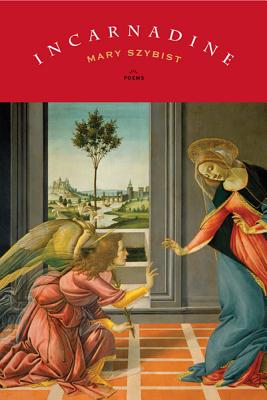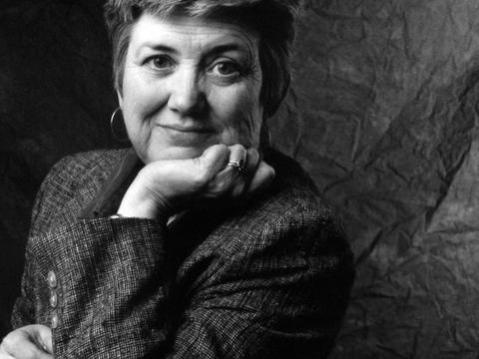New Anthology and NYC Reading with Faculty
November 7 at 6:00
NYU Main Bookstore
726 Broadway by Waverly Place
Please join Elizabeth Arnold, Stuart Dischell, Reginald Gibbons, Maurice Manning, Martha Rhodes, Daniel Tobin and Eleanor Wilner.
Mary Szybist in The Kenyon Review’s Weekend Reads
Mary Szybist’s poem “Girls Overheard While Assembling a Puzzle” is featured online at The Kenyon Review‘s Weekend Reads:
Are you sure this blue is the same as the
blue over there? This wall’s like the
bottom of a pool, its
color I mean. I need a
darker two-piece this summer, the kind with
elastic at the waist so it actually
fits. I can’t
find her hands. Where does this gold
go? It’s like the angel’s giving
her a little piece of honeycomb to eat.
I don’t see why God doesn’t
just come down and
kiss her himself. This is the red of that
lipstick we saw at the
mall. This piece of her
neck could fit into the light part
of the sky. I think this is a
piece of water. What kind of
queen? You mean
right here? And are we supposed to believe
she can suddenly
talk angel? Who thought this stuff
up? I wish I had a
velvet bikini. That flower’s the color of the
veins in my grandmother’s hands. I
wish we could
walk into that garden and pick an
X-ray to float on.
Yeah. I do too. I’d say a
zillion yeses to anyone for that.
Interview with Faculty Member Megan Staffel
A new interview with Megan Staffel discussing her forthcoming collection, Lessons in Another Language, appears online at the Four Way Review:
FWR: “Like “Saturdays at the Philharmonic,” many of the stories in your book Lessons in Another Language portray characters in the midst of some form of sexual awakening. Though the stories are set in the late sixties and early seventies, the characters’ experiences with sex seem more painfully emotional than the narratives of freedom and personal autonomy we so often associate with that period. What are your thoughts on the relationship between subject and chronological setting?”
MS: Culture changes so slowly we don’t see the changes until we hold a memory against the present. In my last collection, Lessons in Another Language, I was compelled to revisit the period I grew up in through fiction because I understand it differently now that I am an adult. I feel a bit wiser because of experience, but I’ve also gained a different perspective through the cultural changes I’ve lived through. That’s where sex comes in. As a culture, it seems to me we are less naïve. I believe (I hope) we are more nurturing of young women. These are generalizations of course, and they’re suspect because they are generalizations, but that’s why we need fiction. Fiction gives us the specifics.
There was a house in my childhood that contained all of the things I didn’t understand. I’ve revisited that house in dreams and in stories. It’s a house my mother spent her summers in as a child and I visited as a child, a big and forbidding stone house built by my grandfather at the foot of a wooded hill in Connecticut. It had a distinctive sound, a wooden screen door snapping closed, and the distinctive smell of old fires in a stone fireplace, and these sensory memories are what launched me into the group of stories that make up Lessons in Another Language, most of which are about characters in the in-between territory after childhood, but before becoming independent adults.
There was a secret in every drawer of every cupboard in that house and in the early sixties, as I wandered about by myself, pretending I was Nancy Drew searching for clues, I found only the mangle sitting by itself in the center of a small room in the attic and in my grandfather’s dresser drawer, a collection of pornographic photos. At nine years old they were both frightening and compelling, but thinking about them now, they gain meaning. My perspective now, influenced as it is by the culture of the 21st century, prompts me to ask, why was it necessary to sleep in ironed sheets, and what an extravagant waste of time it was for the woman of the house to create them, and behind that question is a more interesting one: did my grandfather ever tell his wife his fantasies? I think not. I think they were both constrained by their ideas of married life. He spent his days on the golf course while she was in the attic, running wrinkled sheets through the hot rollers on the mangle, making them crisp and smooth.
When a story takes place is as important as where it takes place, and I would say that the word “setting” includes both place and time and gives them equal importance. The story you mention, “Saturdays at the Philharmonic” was written after the publication of Lessons, but it was written from the same retrospective point of view that inspired the stories in that collection. And yes, you’re right, the sixties and early seventies urged us to enjoy sexual freedom, but that was a reaction against the constrictions of the fifties and also, probably, a direct result of the development of a birth control pill for women. Yet as freeing as the pill was, it also wreaked emotional havoc because we were girls formed by the sheltering mores of the fifties. That’s what’s so fascinating about history. The extremes of one decade “correct” the extremes of the previous decade. For instance, that ubiquitous Beautiful Hair Breck blonde whose pale features were on the back cover of every Life and Look magazine I saw, was the utterly convincing messenger for Breck shampoo and the icon I and many other young girls worshipped. Her every hair was in place and her face was so calm it was death-like. That purity was the ideal of beauty we sought. That is, until the sixties bottomed out and Jimi Hendrix screamed, “Are you experienced?” Then, she was no help to us at all.
Where a story sits in time gives the writer a perspective to work from. It provides the particular images, sounds, and smells that bombard our characters, but perhaps most importantly, it gives us the context that pressures the choices a character makes in his or her life. When is often the subject of the story, but at the very least, it’s a supporting element, one that’s impossible to peel away from character or events.
Mary Szybist is a National Book Award Finalist
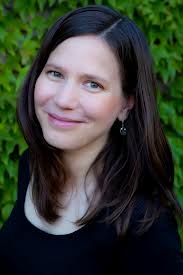
MFA faculty member Mary Szybist’s Incarnadine (Graywolf, 2013) is among five finalists for the National Book Award. Also nominated in poetry are volumes by Frank Bidart, Lucie Brock-Broido, Adrian Matejka, and Matt Rasmussen. Winners will be announced on November 20 at the National Book Award ceremony in New York City.
See the full announcement at the National Book Award website.
Alumni and Faculty at The Rona Jaffe Writers’ Award Ceremony
Warren Wilson alumni and faculty gathered for the 2013 Rona Jaffe Writers’ Award Ceremony and Reading in New York last month. Alumna Margaree Little (poetry, ’12) was awarded the prize, among five others:
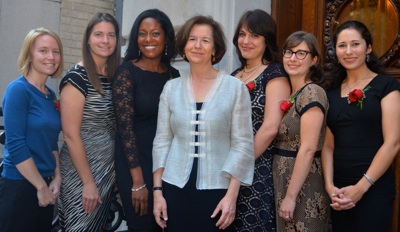 Left to Right: Margaree Little (poetry, ’12) with fellow award recipients Jill Sisson Quinn, Tiffany Briere, Kristen Dombek, Ashleee Crews and Kristin Valdez Quade. Joan Wickersham, the guest speaker, is pictured at center. Photo Credit: Star Black.
Left to Right: Margaree Little (poetry, ’12) with fellow award recipients Jill Sisson Quinn, Tiffany Briere, Kristen Dombek, Ashleee Crews and Kristin Valdez Quade. Joan Wickersham, the guest speaker, is pictured at center. Photo Credit: Star Black.
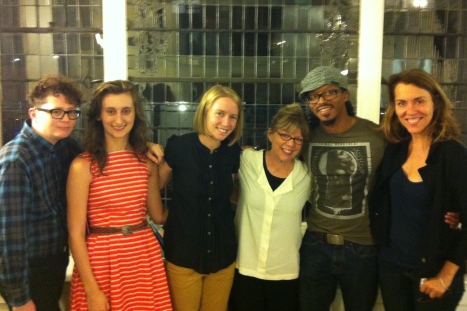 Left to Right: Ray Daniels (fiction, ’10), Lia Greenwell (poetry, ’13), Margaree Little (poetry, ’12), Director of the MFA Program Debra Allbery, Nathan McClain (poetry, ’13), and Catherine Barnett (poetry, ’02).
Left to Right: Ray Daniels (fiction, ’10), Lia Greenwell (poetry, ’13), Margaree Little (poetry, ’12), Director of the MFA Program Debra Allbery, Nathan McClain (poetry, ’13), and Catherine Barnett (poetry, ’02).
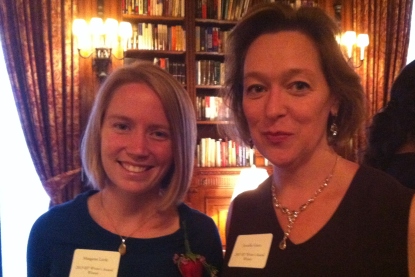 Margaree Little and faculty member Jennifer Grotz, who was a 2007 Rona Jaffe Writers’ Award recipient, at the Award Ceremony.
Margaree Little and faculty member Jennifer Grotz, who was a 2007 Rona Jaffe Writers’ Award recipient, at the Award Ceremony.
The Rona Jaffe Foundation Writers’ Award recipients’ reading at NYU is now available as a podcast:
http://www.cwp.fas.nyu.edu/page/podcast#30672
Quarterly Digest of Awards and Books
Victoria Chang (poetry, ’05), discussing and reading from her new book, The Boss, appears on NPR’s Marketplace.
Angela Torres (poetry, ’09) is the winner of the Willow Books Literature Award for poetry. Her book, Blood Orange, is available now.
Kathryn Schwille (fiction, ‘99) has been awarded a $10,000 fellowship from the North Carolina Arts Council.
Faculty member David Shields’ new biography of the author J.D. Salinger, Salinger, is available now.
Alumna Marian Szczepanski’s (fiction, ’97) new book, Playing St. Barbara, is available now.
New Interview with Ellen Bryant Voigt
A new interview with MFA program founder and faculty member Ellen Bryant Voigt is online in Granta:
Ellen Bryant Voigt’s most recent collection of poems is Headwaters. She is the author of eight volumes of poetry, including Shadow of Heaven, a finalist for the National Book Award, and Messenger, a finalist for the National Book award and for the Pulitzer Prize. Here, she talks about her background in music, the biographical facts pertinent to her new collection and the New Yorker.
RA: You originally trained as a pianist and you’ve spoken about your time as a musician. The musical quality of your poems is celebrated, and it is obvious when reading your poems that this sound-driven lyric is your natural poetic voice. Have you ever tried to write against this inclination, or experiment with narrative or language-focussed poetry?
EBV: I don’t think of music and narrative as being mutually exclusive – some of my poems ARE narrative, and are as ‘sound-driven’ as the lyrics, as least in the making of them. With a few experimental exceptions, almost every poem in the language contains, importantly, aural properties, whether or not these are overt, foregrounded. There is, for instance, the rhythm of the line working with or against the rhythm of the sentence, an inherent music that reminds us of poetry’s beginnings as an art that was danced or sung or spoken. And to some degree, every poem is ‘language-focussed’ – as Auden said, ‘words whispering to one another.’ But if you are referring to theL=A=N=G=U=A=G=E poets’ dismantling of syntactical conventions, the answer is no: I wouldn’t want to give up semantic and even discursive clarity as one tool among many.
Debra Spark’s “That’s Funny”
Faculty member Debra Spark’s essay, originally a Warren Wilson lecture, “That’s Funny,” appears online at Fiction Writers Review:
Three summers ago, I went straight from a ten-day teaching gig at Warren Wilson in North Carolina to Boston, where my father was dying. At least I thought he was dying. In the ten years of his long and heartbreaking decline, there were a lot of hospitalizations, a lot of moments when I thought, “This is it.” But I was wrong. He had recovered, each of those previous times. Well, sort of recovered. He hadn’t died. He was still enfeebled with a long list of health problems—epilepsy, osteoporosis, celiac disease. And then, in the last year of his life, leukemia was added to the list. So, chemotherapy. Also transfusions several times a week, all of this at the hospital where my doctor-father practiced medicine for fifty years.
My family is one that knows how to pull together in an emergency. In the days after my North Carolina job, my brother decided to fly east from San Francisco to see my dad. We didn’t want to scare my father, but if this was indeed “it,” my brother wanted to be there. My mother was already in Boston, ditto my twin sister.
Interview with Robert Boswell
An interview with Faculty member Robert Boswell on, among other topics, his new book, Tumbledown, appears online on the TIn House blog:
Robert Boswell is a patient man. The facts surrounding this interview support this claim.
Our conversation began in Telluride, where he and his wife, the writer Antonya Nelson, have a home. This was a year ago and I should mention that our weekend together began with me flying into the wrong airport some 90 miles north of where he was waiting to pick me up. He stoically stayed up until a shuttle service dropped me off at his home around 1:00am. We spent the next few hours catching up and talking about Alice Munro.
Over the course of the ensuing weekend we must have watched 100 hours of baseball. That might be an exaggeration but it was the playoffs and I don’t think we missed an at-bat. It makes sense that Boswell would love our nation’s pastime; a four-hour, one-run pitching duel is the perfect requiescence for a man who often writes over fifty drafts of a novel. The same sort of patience that goes into his writing can be seen when you are heading home from the bar after the game and you encounter an enormous bear foraging in a nearby trashcan. “We should probably walk a bit faster,” he said.” “But not too fast. Now getting back to Wise Blood.”
And so a year has passed and the baseball playoffs are about to start again (without Boswell’s beloved Astros) and the bears of Telluride are hoping for another autumn book recommendation. The season has brought with it a bit of a relief, for after ten years we have finally gotten another Robert Boswell novel to immerse ourselves in.
Faculty Member and Alumna in EDNA: A Journal of the Millay Colony for the Arts
Faculty member Maud Casey and alumna Jeneva Stone (poetry, ’07) are featured in latest issue of EDNA, “an annual compendium of work from artists-in-residence at the Millay Colony for the Arts, artists’ residency program and artist’ center extraordinaire.”

